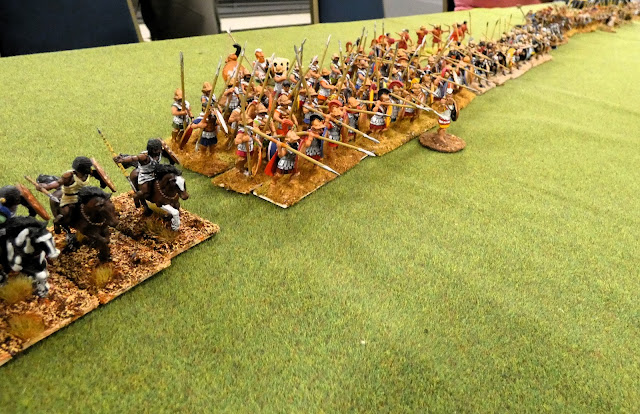The background to this game was when I was reading my copy of Wargames Illustrated issue 436, I came across an article called 'Alala!'.
 |
| https://www.wargamesillustrated.net/product/wi436-april-2024/ |
This was a light bulb moment, as I have a reasonable sized Hoplite force which has been waiting for a set of rules.
'Alala!' written by Simon MacDowall are a set of rules specifically designed for a Hoplite warfare. They have taken the essence of the battles from that period and set them out into a set of rules that are easy to pick up. This was ideal for a club game which could take six players.
Set up of game.
On the day the players split into two groups of three and four, with Stephen, Nathan and Mike B taking the Spartans and Allies, by Vince, John R, Mark, Vince and Paul who took the Thebans and Allies.
Basically the Spartans and Thebans were “A class “elites and Allies were not so good.
Each player would be given a phalanx of Hoplites, consisting of two or three units plus light troops in support. Vince and Paul shared a command. They then threw a dice for their command action level.
It was now time to place the figures on the table. This was done by using a deck of cards, with black cards were for deploying Thebans and red for Spartans. For some freakish reason the Thebans had
deployed most of their forces before the Spartans. (note to umpire shuffle cards next time). The effect of this was that the Spartans piled all there good stuff against the weaker Theban flank and the skirmishers were massed against the elite Theban deep phalanx.
It was now time for both sides to make their plans and enjoy looking at an 8' x 4' table full of figures; no terrain, but that would just get in the way.
Game Begins.
This is where these rules start to capture the period. The first phase of the game is taken up by winding up your Hoplites, each commander spends his actions, to Control units (stop them running forward), 'Encouraging' (raising the units aggression) and Invoking the Gods (picking a random card some give an advantage, some don't... Needless to say there are not always enough actions to do all these things and “C Class” troops are expensive to encourage and can loose control). Both sides had units which broke ranks.
In addition while this was going on, the light troops are doing their job trying to get through the opponents lights and then taking out hoplites.
Hoplites Attack.
Both sides now give orders for the real battle to commences and the Phalanxes start to advance. Before this order is given only uncontrolled eager hoplites may move. The Spartan right and centre are the first to give this order. They have been goaded by some better than expected hits from the Theban lights.
As expected both forces collide in the middle of the table, however things are not as clear on the Spartans left, this had been refused it did not advance. The Phalanx Commander Stephen had the rump of the Spartan force and was in no hurry to take on the Theban elites under Vince and Paul. He therefore used his considerable force of lights and cavalry to slow down the elite Thebans while he slowly came in support of the centre.
Back on the other flank and centre both sides were now locked in combat, this was a game of attrition. Victory in each turns melee was down to throwing lots of dice, based on number of troops, eagerness, support, who won last time and where the commander was. Needless to say victory went to the player with the luck. The breakthrough eventually happened when John's Theban Allies started to break the Spartan Allies under Nathan.
By this time the game had been going for nearly five hours and it was time to pack up and call it a day.
So victory was given to the Thebans. Although Mike with his elite Spartans on the right flank had been fought to a standstill (his commander was killed so they lost out on command action) by Marks Allied Thebans, it was agreed that they would have been able to retire safely and fight another day.
Wash Up.
That was a game which we all enjoyed. It was not without some fierce discussions as to rule interpretations. Recommend that the game has an umpire, however the rules stood up well. They gave
the flavour of the warfare in the Peloponnesian War, simple to pick up, well laid out and a good QRS.
It was the first time that any of us had played the game and at the end it was agreed that everyone made tactical errors which would not be repeated. This I think made the game even more interesting as the game went on. Unfortunately some of the errors from early in the game laid the seeds of defeat later on. Those pesky lights weakened some hoplite units so there performance in the main battle was not as good.
If you want to put on a multi player club game give these rules a go. They can be bought from the Society of Ancients Publication and I received them by return of post. Great service.
 |
| https://www.soa.org.uk/joomla/games2/233-alala |
Well done all those who took part and to Simon MacDowall for his cracking set of rules.



























